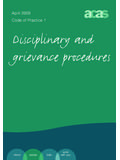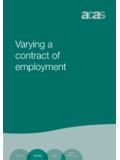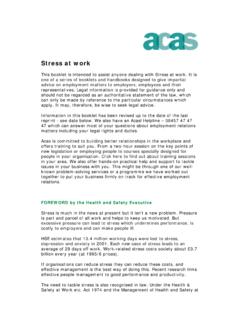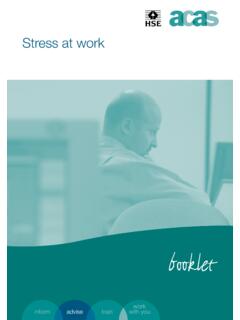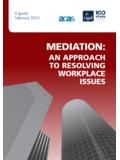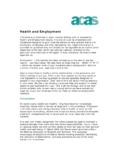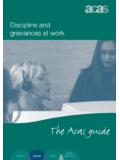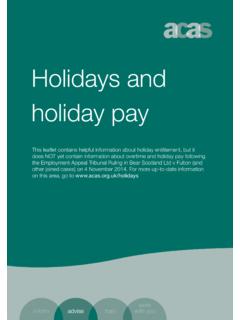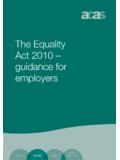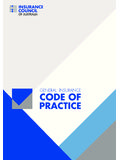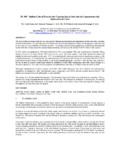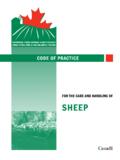Transcription of CODE OF PRACTICE ON DISCIPLINARY AND …
1 code OF PRACTICE ON DISCIPLINARY AND GRIEVANCE PROCEDURESM arch 2015 code of PRACTICE 1 Published with the permission of Acas on behalf of Her Majesty s Stationery Office. Crown Copyright 2015 All rights in the typographical arrangement and design is vested in the Crown. Applications forreproduction should be made in writing to the Office of Public Sector Information, Information Policy Team, Kew, Richmond, Surrey TW9 published 2015 ISBN 978 0 11 708279 3 Printed in the United Kingdom by The Stationery 03/15 47526 Further copies may also be obtained from Acas Publications, Swallow Field Way, Hayes,Middlesex, UB3 1DQ.
2 Tel: 0870 242 by TSO (The Stationery Office) and available , Telephone, Fax & E-mailTSOPO Box 29, Norwich, NR3 1 GNTelephone orders/General enquiries: 0870 600 5522 Fax orders: 0870 600 5533E-mail: 0870 240 3701 TSO@Blackwell and other Accredited AgentsCODE OF PRACTICE 1 code OF PRACTICE ON DISCIPLINARY AND GRIEVANCE PROCEDURES1 ForewordThe Acas statutory code of PRACTICE on discipline and grievance is set out at paragraphs 1 to 47 on the following pages. It provides basic practical guidance to employers, employees and their representatives and sets out principles for handling DISCIPLINARY and grievance situations in the workplace.
3 The code does not apply to dismissals due to redundancy or the non renewal of fixed term contracts on their expiry. Guidance on handling redundancies is contained in Acas guide Handling small scale redundancies a step by step guide and in its advisory booklet How to manage large scale redundancies .The code is issued under section 199 of the Trade Union and Labour Relations (Consolidation) Act 1992 and was laid before both Houses of Parliament on 16 January 2015. It comes into effect by order of the Secretary of State on 11 March 2015 and replaces the code issued in failure to follow the code does not, in itself, make a person or organisation liable to proceedings.
4 However, employment tribunals will take the code into account when considering relevant cases. Tribunals will also be able to adjust any awards made in relevant cases by up to 25 per cent for unreasonable failure to comply with any provision of the code . This means that if the tribunal feels that an employer has unreasonably failed to follow the guidance set out in the code they can increase any award they have made by up to 25 per cent. Conversely, if they feel an employee has unreasonably failed to follow the guidance set out in the code they can reduce any award they have made by up to 25 per and employees should always seek to resolve DISCIPLINARY and grievance issues in the workplace.
5 Where this is not possible employers and employees should consider using an independent third party to help resolve the problem. The third party need not come from outside the organisation but could be an internal mediator, so long as they are not involved in the DISCIPLINARY or grievance issue. In some cases, an external mediator might be potential DISCIPLINARY or grievance issues can be resolved informally. A quiet word is often all that is required to resolve an issue. However, where an issue cannot be resolved informally then it may be pursued formally. This code sets out the basic requirements of fairness that will be applicable in 2 code OF PRACTICE 1 code OF PRACTICE ON DISCIPLINARY AND GRIEVANCE PROCEDURES2 code OF PRACTICE 3 TIME OFF FOR TRADE UNION DUTIES AND ACTIVITIES1.
6 Under section 199 of the Trade Union and Labour Relations (Consolidation) Act 1992 Acas has a duty to provide practical guidance on the time off to be permitted by an employer: (a) to a trade union official in accordance with section 168 of the Trade Union and Labour Relations (Consolidation) Act 1992; and (b) to a trade union member in accordance with section 170 of the Trade Union and Labour Relations (Consolidation) Act 1992. Section 199 of the Act, as amended by the Employment Act 2002, also provides for Acas to issue practical guidance on time off and training for Union Learning Representatives.
7 This code , which replaces the code of PRACTICE issued by Acas in 1998, is intended to provide such background2. Since the Employment Protection Act 1975, trade union officials have had a statutory right to reasonable paid time off from employment to carry out trade union duties and to undertake trade union training. Union officials and members were also given a statutory right to reasonable unpaid time off when taking part in trade union activities. In 1989 restrictions were introduced on the range of issues for which paid time off for trade union duties could be claimed to those covered by recognition agreements between employers and trade unions.
8 Additionally union duties must relate to the official s own employer and not, for example, to any associated employer. All the time off provisions were brought together in sections 168 - 170 of the Trade Union and Labour Relations (Consolidation) Act 1992. Section 43 of the Employment Act 2002 added a new right for Union Learning Representatives to take paid time off during working hours to undertake their duties and to undertake relevant training. Introductionmost cases; it is intended to provide the standard of reasonable behaviour in most would be well advised to keep a written record of any DISCIPLINARY or grievances cases they deal may wish to consider dealing with issues involving bullying, harassment or whistleblowing under a separate comprehensive advice and guidance on dealing with DISCIPLINARY and grievance situations is contained in the Acas booklet, Discipline and grievances at work: the Acas guide.
9 The booklet also contains sample DISCIPLINARY and grievance procedures. Copies of the guidance can be downloaded from the Acas website at the code employment tribunals are not required to have regard to the Acas guidance booklet. However, it provides more detailed advice and guidance that employers and employees will often find helpful both in general terms and in individual OF PRACTICE 1 code OF PRACTICE ON DISCIPLINARY AND GRIEVANCE PROCEDURES3 The code of PracticeIntroduction1. This code is designed to help employers, employees and their representatives deal with DISCIPLINARY and grievance situations in the workplace.
10 DISCIPLINARY situations include misconduct and/or poor performance. If employers have a separate capability procedure they may prefer to address performance issues under this procedure. If so, however, the basic principles of fairness set out in this code should still be followed, albeit that they may need to be adapted. Grievances are concerns, problems or complaints that employees raise with their code does not apply to redundancy dismissals or the non renewal of fixed term contracts on their Fairness and transparency are promoted by developing and using rules and procedures for handling DISCIPLINARY and grievance situations.
